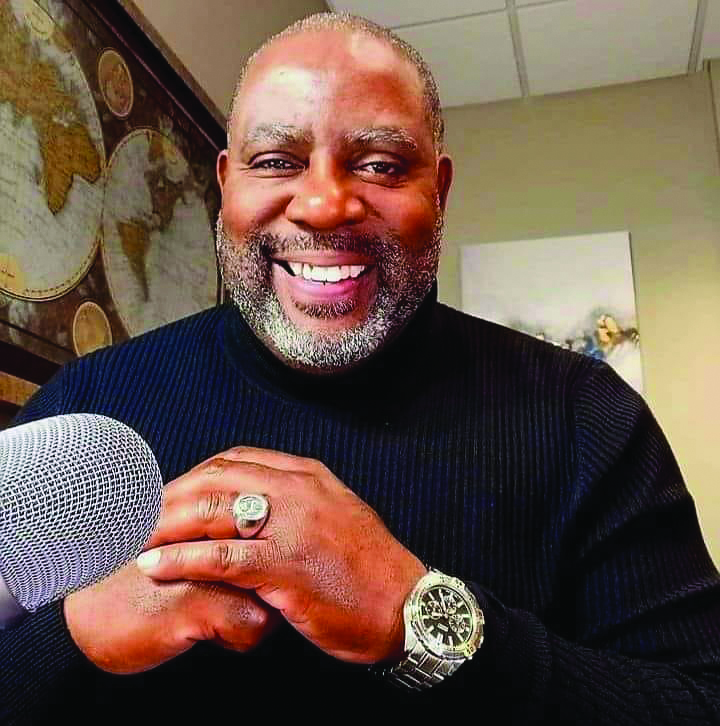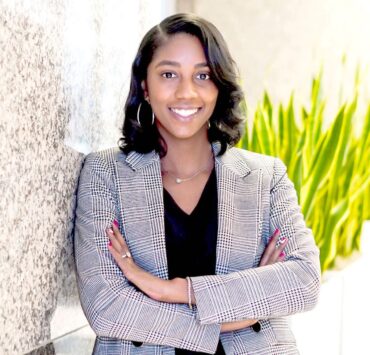
918 Series
Kimberly Marsh and Gary Lee
Photo, Facebook
Tulsa’s Economic Development Director Erran Persley, who began his new role in March 2024, spoke with The Oklahoma Eagle Managing Editor Gary Lee and Eagle contributor Kimberly Marsh about his plans for equitable economic growth across the city.
As Economic Development Director, Persley will serve as the lead facilitator between the city government and economic development partners such as the Tulsa Regional Chamber and the Tulsa Authority of Economic Opportunity (PartnerTulsa) to ensure the City of Tulsa’s economic goals are achieved.
This is part of The Oklahoma Eagle’s 918 occasional series in which we spotlight impactful leaders of the community and ask them nine questions. Persley’s perspective is so vital that we added a bonus question.
Q: What are your priority projects for economic development in Tulsa?
Persley: One big project that we closed, working with Daniel Regan at the airport, was the NorSun project. That was the $600 million investment, 300 job project that went to the airport. I do a lot of behind the scenes work on bringing those projects to fruition, working with PartnerTulsa, the Tulsa Regional Chamber and the airport. We’re now working on another to bring in another foreign company. I can’t give details. But it would possibly be bigger than the NorSun deal for the city.
Q: How do you plan to ensure economic benefits reach all parts of Tulsa, including north Tulsa?
Persley: This is probably my biggest goal and challenge. As we attract new companies to Tulsa, how do we ensure that the benefits reach all sections of our city? How do I connect people in north Tulsa or west Tulsa to jobs in a purposeful way? In fact, City Councilor Vanessa Hall-Harper and I had a discussion that if we’re building a lot of things at the airport right, how can I make sure we have a system that gets the people from far out north Tulsa to those jobs out by the airport? Economic development can’t just be to attract and recruit companies. How does everyone benefit? How does the community grow from that company being in their space? I think that I have to put in more time and attention into figuring that part out.
Q: Are you integrating the other chambers, the cultural chambers and the Black Wall Street Chamber, the Greenwood Chamber, Hispanic Chamber, into the work that you’re doing?
Persley: I’ve been actively engaging with the Black Wall Street Chamber. I’ve been purposeful about going around the city, not just staying downtown or at the airport. Some places don’t get as much attention as others or as much face time as others. I’ve been cognizant of touring north Tulsa, talking to community groups, and understanding their needs. I plan to meet with all chambers, including the Hispanic Chamber of Commerce, before the end of the year.
Q: What are your thoughts on workforce preparation for Tulsa’s economic future?
Persley: We need to train our existing workforce and recruit new talent to fill gaps. Years ago, I heard Wayne Gretzky, the great hockey player being interviewed, and they asked him, ‘why are you such a great hockey player?’ and he said, ‘I learned to go where the puck is going to be and not where it is.’ That is my approach to economic development. We need to look at future sectors and prepare our workforce for those areas. Tulsa has great potential. It’s a cool, quirky city with an abundance of opportunity. Our challenge is to grow the city while maintaining its unique character.
Q: How do you plan to address the persistent disparities between Tulsa’s Black community and the rest of the city?
Persley: Sadly, this is a universal problem in most places, and it requires addressing the issues in a purposeful way. It’s one thing to know there is a problem, but it’s a whole different thing to actually change policies and procedures to address it. Hopefully, that’s the road that we’re on right now.
Q: What can Tulsa do to mitigate the impact of corporate chain and big box store closures?
Persley: We need to develop communities the right way, to find new ways to build up entrepreneurship in the community. My view is you need to find ways to build up entrepreneurship in the community and help people in the community to own businesses so that, number one, they are committed to community. I went to see a great program that trains young men and women to be developers, to give them the tools they need. That’s great, but when they graduate what do we (as a city) do to help to make that transition into developing a property? That bridge is not there, and I’m hoping that one of the first steps is going to be the new Kirkpatrick Heights – Greenwood project. There will be an opportunity for us to do development in a different kind of way, where people in the community can actually be part of the actual development of whatever that ends up being.
Q: How does housing fit into your economic development strategy?
Persley: Sometimes we forget that economic development is not just recruiting companies and helping companies to stay here. We have a big emphasis on affordable housing, sometimes with a big A, but what we don’t talk about is workforce housing. I’ve got companies that are coming here, and their question is, where are my people going to live when I bring them into this city? Housing is a crucial part of economic development, and we need good housing stock throughout the community, not just one side of town, where there are grocery stores that are viable and all things needed for truly living, breathing communities across the city.
Q: From what you know of the Kirkpatrick Heights-Greenwood Master Plan, are you comfortable with the direction that it’s going?
Persley: The ultimate goal is for the Tulsa Community Development Corporation (CDC) to control and develop that property. Initially, I was concerned about the timeline being too spread out, but after meeting with Garry Clark, the new CEO of PartnerTulsa, I learned he has a much tighter deadline. My focus has been on ensuring the CDC controls and develops this property. I’m now sure that we share the same goal and will do everything we can to make that happen.
Q: Is there a better way to both integrate the work developers are doing here and make it more equitable for people of color in the communities here?
Persley: This needs to be done upfront as new companies come in. I see my role as interviewing these companies as much as they’re interviewing us. I ask them how they’ll add to our community, help build it up, invest in local programs, and use local contractors. Sometimes the same small group of people get invited to the table and we have to expand who’s invited to those conversations, including small developers from around the city.
Q: What would you like to be known for achieving in Tulsa in the next five years?
Persley: I would like for people to say that I expanded economic development throughout all parts of the city, offered opportunities for everyone to be part of Tulsa’s growth, and did so in a focused and purposeful way. If I can get people who aren’t typically part of the system, not only engaged and employed, but helping make decisions about how the city moves and grows, that would be success.








